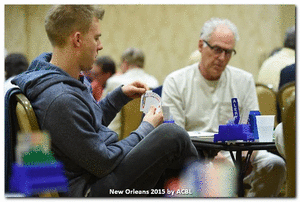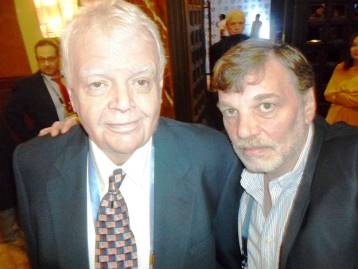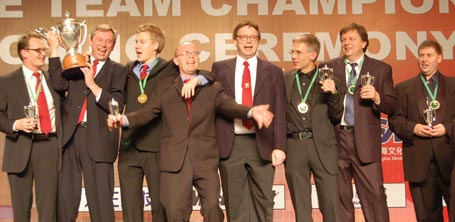![]() Big, Rich Cheaters! Bridge World Rocked as Top Players Busted BY 9/23/15
Big, Rich Cheaters! Bridge World Rocked as Top Players Busted BY 9/23/15
In the thousands of hours Boye Brogeland has spent playing bridge, he had never before proffered such a bold declaration—not even an artificial two clubs bid. Seated at home in the picturesque harbor village of Flekkefjord, Norway, in late August, he gazed at his computer screen, at the words he had written and was about to post online: “If you have a cheating pair on your team.…”

But before doing so, he alerted the authorities. His accusation, he knew, would reverberate North and South, East and West across the global coordinates of high-stakes contract bridge. It could end the careers of the reigning European champions, Lotan Fisher and Ron Schwartz, the former known as “the wonder boy of Israeli bridge”; it would also likely mean a terminus to their six-figure income, their Bali-to-Biarritz jetsetting lifestyles.
Brogeland also knew that the men whose livelihoods he was about to kill had powerful and extremely wealthy friends, men whose very behavior at the square table betrayed malevolent intentions. “I phoned the Norwegian police,” says Brogeland, a professional bridge player who is ranked 64th by the World Bridge Federation (WBF). “They told me, ‘When you blow the whistle, do not be at your home address.’”
The Sheriff and the Anonymous Astronomer
On September 26, the Bermuda Bowl, a biennial international event that happens to be the most prestigious tournament in all of bridge, commenced in Chennai, India. Of the 22 nations that qualified to play in the fortnight-long championship, three have dropped out in the past month: Israel, which boasts the tandem of Fisher and Schwartz, the reigning European champions; Monaco, whose duo of Fulvio Fantoni and Claudio Nunes are the No. 1 and No. 2 ranked players in the world, respectively; and most recently, Germany.
The absences of Fisher-Schwartz and Fantoni-Nunes at the Bermuda Bowl are due directly to the punctilious investigative efforts of Brogeland. In fact, all four men are facing lifetime bans from competitive bridge. He may only be the world’s 64th-ranked player, but there is no more formidable opponent in bridge than Brogeland (Germany withdrew after its top pair, in the aftermath of the investigations, pre-emptively confessed to cheating).

“Boye is the sheriff who rode into town,” marvels Bob Hamman, a Texan who has won 10 Bermuda Bowls and is to contract bridge what Doyle Brunson is to Texas Hold ’Em. “He’s Judge Roy Bean. He’s the man of the year.”
Imagine if you will, NFL fans, a crusader who took on the most successful teams in his chosen sport and who just happened to have the facts indisputably on his side. Who conducted his investigation not by spending millions of dollars on private investigators, but rather via crowd-sourcing YouTube videos and enlisting the help of willing volunteers from as far away as Australia, from legends of the game (such as Hamman) to an anonymous astronomer from the Netherlands.
Now imagine that none of this was undertaken for personal gain or image safeguarding—was in fact, initiated at both fiscal and professional expense—and that the provocateur, Brogeland, demanded that any Master Points he had «won» (his quotations) as an erstwhile teammate of Fisher and Schwartz be vacated. And that he continued unbowed after one of the men he accused, Fisher, posted these words on Facebook: “Jealousy made you sick. Get ready for a meeting with the devil.”
“My only motivation is to try to clean up the game and do the right thing,” says Brogeland, whose grandparents taught him to play bridge when he was 8 years old. “Don’t worry about the consequences. This is what my mother would do. This is what my father would do. I hope this is what my children would do.”
“Boye [has] made it his personal campaign to clean up the game,” says Jeff Meckstroth, an American who is ranked eighth in the world by the WBF and has won the Bermuda Bowl five times.
This is the story of a bridgegate that is altogether unlike the one involving a certain New Jersey governor and the town of Fort Lee (that is, except for the shared traits of skulduggery, whistleblowing and personal threats). This is the story of, as Brogeland puts it, “A rebellion staged by the bridge players themselves, via the Internet, to save the game.”
Click Here to continue reading
